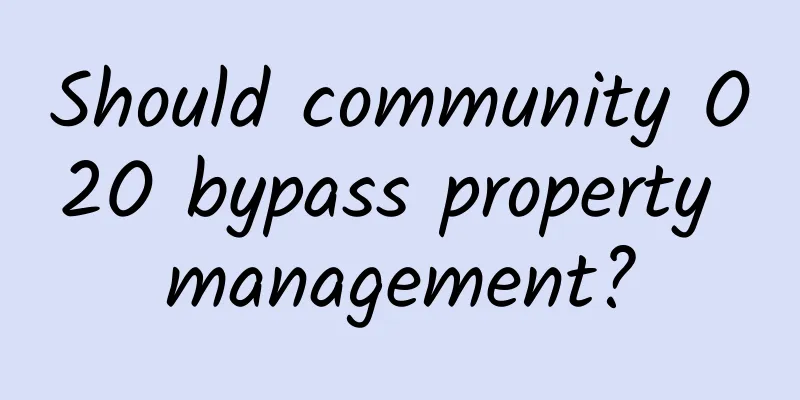Should community O2O bypass property management?

|
On the one hand, the media is constantly promoting it, and on the other hand, practitioners are advocating it everywhere. As a result, the calls for community O2O are getting louder and louder. However, for residents, community O2O is only heard but not seen. It seems that it is just a self-entertainment of industry insiders, and it is still far from actual use. At present, the core problem that plagues the entire community O2O lies in "property". Not only are Internet companies unable to penetrate property, but even the property itself has not figured out the role of "property" in community O2O. Should community O2O bypass property management? Should community O2O bypass property management? Most of those who raise this question are Internet companies, who have either not yet made in-depth contact with property management, or have been turned down by property management, or have not even figured out what community O2O is. It is normal for those who have never been exposed to property management to want to bypass it. These people all approach it from the perspective of the Internet, thinking that bypassing property management can quickly scale up and platformize, but they don’t know the importance of property management in this process. Those who have been rejected by property management know that property management is difficult to penetrate, and can only hope to get rid of their dependence on property management to develop. What do you think is the core of community O2O? It is definitely not the tool function of the Internet. Nowadays, the traffic of (mobile) Internet has been completely divided up. If you want to enter community O2O in the form of the Internet, you are actually competing with Internet giants. For example, Xiaoqu Wuyou and Xiaoqu Guanjia, how can they compete with BAT, Meituan, Dianping, and 58? No chance. The biggest market significance of community O2O is that it provides market opportunities that are difficult for Internet giants to penetrate. The offline service part is what Internet giants cannot reach. Therefore, to do community O2O, you must go deep into the offline, and it is difficult to bypass the property when you go deep into the offline. However, the problem of community O2O lies here: it cannot bypass the property management, nor can it go deep into the property management, and the property management itself cannot do well. As a result, community O2O has become a "joke" today. Develop a CRM, ERP, and APP for property management staff? That’s unnecessary! Well, let's talk less about concepts and theories and more about the actual situation to help you better understand the problems faced by community O2O. In the eyes of some community O2O entrepreneurs who have entered the market through the Internet, since they cannot bypass the property management, they should help the property management solve some problems. But how to solve them? The most common method is to develop an APP with various functions such as CRM and ERP, and then give it to the property management company for free. Logically, this is a completely feasible approach. The cost of developing an APP ranges from hundreds of thousands to millions. Now that it is free for the property management company to use and can help improve the efficiency of the tool, why wouldn’t the property management company do it? However, the reality is that the property management company doesn’t use it! Some relatively large property management companies have CRM and ERP capabilities. This type of business has always been one of the main businesses of real estate software service providers such as Kingdee, UFIDA, and Mingyuan. Are you developing a new set of products to compete with them? First, the products are definitely not as professional as theirs; second, the property management has been accustomed to their products, so why switch to yours? Third, how to connect your APP with their backend system; fourth, the systems of community property management will be different. Do you have to redevelop each one? How much R&D cost will that be? As for some relatively small property management companies, if you give them a set of CRM ERP APP service solutions, they will use it! Even if they use it, will their security guards, cleaners, and maintenance workers use it? It is even a question whether their mobile phones can download these APPs! Some people think that it is too simple to gain recognition from property management companies in this way. Community forum deadlock: conflicts between residents and property management Of course, we cannot rule out that some properties are willing to try. For example, a property previously launched an APP, and the management objected to the lack of activity on the APP and asked the developer to add a community forum. After adding the community forum, the user activity did increase a lot, but the reason for the increase was collective complaints about the poor quality of property services! Interesting, right? The property management team was worried that it would not work if all the complaints were going on. How could the property management team continue to work in the long run? So they had to provide the developer with the right to delete posts. In order to gain the support of the property management team, the developer could only provide the developer with the right to delete posts. In the end, the property management team deleted all the negative posts, but at the same time, the users were no longer active. At present, most residents and property management companies generally have conflicting emotions. This is an inevitable result determined by market factors, and it is also the dead end of community forums. Some issues are openly put on the table for debate, which can only intensify the conflict. Property management companies do not want to make the issues public in forums. In fact, many communities have QQ groups for property management committees, but QQ groups are different from forums. If property management companies provide forums for residents to complain, it is purely looking for trouble. You don’t understand the “unspoken rules” of property management, but still dream of community O2O? Another reason why many community O2O Internet products are difficult to be accepted by property management is that they do not understand the "unspoken rules" of property management. Do you think the small advertisements for lock repair, drainage and bottled water delivery at your door are posted for free? Do you think the waste collectors can enter the community at will? Do you think the construction costs of public facilities in the community can be made public? Do you think the community access card is only used for access control? Do you think that the billboards in the community can be used for advertising at will? In addition, can your product make residents pay property fees on time? Are you rashly negotiating cooperation with property management without even figuring out these issues? Are you still dreaming of community O2O? If the product damages the interests of others, it will inevitably be rejected. The community is a complicated place. When dealing with property management, you have to explore the way first. It is difficult to survive by relying solely on admission fee subsidies. The key is to help the property make money. After being rejected by the property management company, some community O2O startup teams even began to consider whether they should pay some money to smooth the relationship with the property management company. Having such an idea only shows that you are naive and still do not understand the hidden rules of the property management company. Even if you want to make arrangements, who should you give the money to? To the manager of the community property management company? Maybe some of the small money that cannot be seen in the open is taken over by the community security captain and then "shared" with various stakeholders. All of this depends on the connections. Even if the property manager accepts your "entrance fee", do you think your product can be implemented at the execution level? The people working below do not get any benefits but have more tasks to do. Do you think they will carry out the work seriously? The staff in the property do not have such high professionalism. In addition, property management is a "hungry ghost" that can never be satisfied. Once you give them money, they will want more. On average, a community pays 2,000 yuan per month to the property management, which is 24,000 yuan a year. The annual fee for 10 communities is 240,000 yuan, and 100 communities is 2.4 million yuan. Do you still want to scale up? Such high costs are a huge amount of money that entrepreneurial companies cannot afford. Moreover, for the property management, you can just sit there and collect money, how can you expect them to help you do it? Therefore, the best way is not to give money to the property management, but to find a way to help the property management make money. But how to make money is another big problem. Households with property management relations can enter the community, but they are also subject to many restrictions Property management is a very realistic service industry. The idealism of the Internet doesn't work here. Want to enter a community? Then you have to pay the property management an entrance fee, or help the property management make money, or you have connections. China is a relationship-based society. If you have connections, everything is easy. Many practitioners I have talked to so far have gained the opportunity to enter one or two communities through connections. Without money and connections, the threshold to enter the community is very high. Even if you have connections and enter the community, your activities will still be restricted by the property. Small and medium-sized property companies don't understand the Internet and are afraid of letting them mess around, so even some cooperation will be carefully restricted by the property companies in all aspects; large properties will try some businesses on their own, and if there is no competition conflict, they can allow the related households to do it on a trial basis. Once there is competition, or if the property company can do some business itself, the related households will be kicked out soon. Rich and willful, spending money to subsidize users, crying in the corner after the excitement There are also wealthy and well-connected giants in this industry, especially those small giants from the Internet industry, who are very willful because they have money. They are more accustomed to using the Internet's methods, packaging the brand first, bringing out the background of some giants' investment, and then talking to the media about how awesome their own advantages are. After several rounds of packaging, at least from a public relations perspective, they have gained a foothold and become the subject of heated discussion. Then, on the user side, spending money to subsidize users and expanding the scale became one of the core strategies. Through some exemptions and lottery activities, a lot of seed users were indeed accumulated in the short term, but the bottleneck period will soon appear. It is unsustainable to attract users through subsidies. When the subsidy intensity decreases, users will lose interest. For example, the lottery function of a community APP initially had a winning rate of 1/6, but as cost pressure increased, the winning rate dropped to less than 1/20. As a result, users were not interested in it, new users did not come, and old users were lost. The price of being rich and willful is to cry silently in the corner later. The battle for property is about to begin, and real estate giants are eager to try It is not just Internet companies that are rich, real estate giants are also not short of money. Facts have proved that the core of community O2O is implementation, and implementation is inseparable from property. Now real estate giants seem to have realized this. Vanke, Longfor, Greenland, China Overseas, China Merchants, Greentown, Poly, etc. have all begun to try community O2O projects. The involvement of real estate giants in the community O2O market is a good thing for the industry, but not so good for entrepreneurs. These giants are more willing to rely on their own strength to promote community O2O projects, or choose to cooperate with Internet companies of equal status. It is more difficult for some Internet entrepreneurs to rely on large real estate companies to develop community O2O. Without the possibility of support from large real estate companies, it will be even more difficult for community O2O entrepreneurs to obtain investment. In addition, these real estate giants are ambitious. If community O2O is feasible and profitable, who would just stay at home and guard their own small piece of land? The scene of big fish eating small fish has already begun. Under community O2O, property acquisition prices are rising In fact, the enclosure movement of property companies has already begun. The well-known Caishenghuo is just one of them. In addition, many large property companies are quietly annexing small and medium-sized properties. As the concept of community O2O continues to gain popularity, the acquisition price of properties has also risen. The price quoted by a first-level qualified property company of a certain scale is 10 to 20 million yuan, and the price quoted by a second-level qualified property company is 5 to 8 million yuan, which is already very high. Generally speaking, a first-class property management company can manage a community of 2 million square meters, and a second-class property management company can manage a community of 1 million square meters. If you do the math, the cost of expanding community O2O by acquiring properties is already high, and will continue to rise. Nowadays, the concept of community O2O is very popular, and many small and medium-sized developers will acquire some property management companies to do this, which has also pushed up the price of properties to a certain extent. In fact, the form of acquisition and expansion is prone to problems, especially in the human-driven industry such as property services, where employment is the biggest uncertainty factor. Recently, the property acquired by Color Life in Nanjing has caused considerable trouble, and many people in the industry are seeing the joke of Color Life's acquisition and expansion. How should property management companies implement community O2O? Service awareness is the key Now many property companies are paying attention to community O2O. They all want to try something and find opportunities, but they don’t know how to do it. Some Internet projects from outside look good, but when they are implemented, they are found to be unrealistic. Some large real estate companies are relatively more powerful and bold, and are willing to make some attempts. However, the problem is that these giants are a bit greedy and design community O2O projects that are large but not refined. The rules and regulations say a lot of directions, but the implementation is very complicated. Caishenghuo is just one of them. Poly's latest community O2O strategy will inevitably have problems when it is implemented. You can't do porcelain work without diamonds. Even giants have to focus on community O2O. When I was communicating with a property manager before, he asked me what should be paid attention to when the property is doing community O2O. My answer is only one thing, that is, service awareness. From top executives to basic employees, they all need to have a sense of high-quality service. Only when the service is done well, other businesses will be more possible. One of the important reasons why e-commerce has impacted traditional retail is that service awareness has been overlooked. For example, when you buy a piece of clothing offline and return it, the salesperson will be very reluctant, but it is very simple to return it on e-commerce. What property management needs to learn is not Internet technology, but this kind of service awareness. If you can't even provide good service, why should residents trust your service and products? "Property management service", service is the key. Don't listen to the nonsense of Internet people, it is impossible to have free property In the past, many Internet practitioners have called for "free property management fees". They are just looking for fun and are not afraid of trouble. This is easy to say, but it is pure nonsense when it comes to doing it. Property management fees are the foundation of the survival of property management companies. Not collecting property management fees will only lead to death. Can consumption on the property management platform offset property management fees? Residents must recognize their services and be willing to consume on their platform. The wool comes from the sheep, and the wool comes from the pig. How much consumption on the property management platform can offset a year's property management fees? Even if it can offset it, residents will definitely think that the property management has made a lot of money from it, and there must be something fishy, so it is better to pay the property management openly. Moreover, e-commerce is so developed that there are many places that can replace property management consumption platforms. This kind of thinking of relying on consumption to offset property management fees is too idealistic and it is impossible to popularize it. In addition, are the property management companies stupid? They don't want the property management fees that are legally collected every year, but go through so much trouble to earn the fees that should belong to them? Once the income and expenditure are not balanced, the property management company is simply digging a hole for itself. Property management fees are the easiest to earn, but they insist on letting the property management company do the most difficult thing to earn money. Some Internet people are too idealistic. It's ok to talk nonsense. How can a contract-based property management company have the leisure and ease to engage in community O2O? Are you still not giving up on the property management? Are you still advocating that the property management company build a community platform? Please stop being ridiculous. Most property management companies are contract companies. Will the homeowners committee renew the contract in the future, will they evict the property management company in advance, will the property management company withdraw on its own, etc.? These are all big questions. How can you have the energy to build a community O2O platform? Only a few large real estate companies are truly capable of building community O2O platforms, while a much larger number of small and medium-sized real estate companies are actually powerless to do community O2O. Moreover, community O2O is not as simple as providing a network platform. It is not difficult to do this, but the difficulty lies in how to help them operate. Integrating surrounding businesses is easy to say, and real estate companies will not do it, and cannot do it. The property is not completely impermeable, the key is to control the lifeline Is the above the most practical information about community O2O that you have seen? Collect, forward, and reward it. In the community O2O market, property or not property is a problem that bothers everyone, including the property itself. Problems also mean opportunities. The key is how to solve the problems. Recently, I have also received many visits from community O2O, including those from Beijing, Shanghai, and Shenzhen. Some of them came to ask me what to do because their projects were about to fail, some came to understand the industry first and are considering entering this industry, and some property developers are thinking about the feasibility of this market. Through communication with different people, I have come to the conclusion that the property industry is not completely impenetrable, and it mainly depends on whether you choose the right entry point. My current attitude towards the community O2O industry is "see through but don't speak out". There are many problems in this industry. Of course, many entrepreneurial teams have come up with suitable solutions. The directions that some entrepreneurial teams that I approve of are trying are not suitable for public discussion for the time being. However, I can remind you that whether you can give the property management an irresistible cooperation plan is the key to test whether the project is feasible or not. As I said before, community O2O is not about giving money to the property management, but about helping the property management make money, save money, and improve the quality of service. So, don't think too much, just see if this project can do practical things. "Trust" is the core competitiveness of community O2O Looking deeper, the biggest obstacle to the development of community O2O is not just the property management, but the residents' inherent lack of trust in the property management. Although it seems that the primary problem of community O2O is that it is difficult to implement and it is difficult to get into the community through the property management. However, it is also difficult for the property management itself. Residents themselves lack trust in the property management and may even have oppositional emotions. In such an environment, community O2O cannot be carried out at all. How to solve the trust problem is a problem for the property industry. Therefore, as mentioned above, if a property company wants to do community O2O, the most important thing is to change the service attitude and have a high-quality and unified service awareness from top to bottom. If the property company can provide residents with very satisfactory services, some value-added services will be more easily accepted. Otherwise, with the current antagonistic relationship, who knows whether the property company's products are trustworthy and whether there are any tricks? The lively community O2O, most people are still confused In this article of more than 5,000 words, I have said everything that can and should be said. Of course, some of them were not detailed enough, and some things that were not appropriate to talk about were not mentioned. Overall, I only gave a general outline, which may be a bit messy, mainly because some deeper content cannot be summarized in a few words. The community O2O market is quite interesting now. I have come into contact with many people, including the onlookers, industry media, entrepreneurial teams, teams to be entrepreneurial, property companies, and investors. Among them, the onlookers have nothing to complain about, the industry media are enthusiastic about it, the entrepreneurial teams are confused, the teams to be entrepreneurial are full of enthusiasm, the property companies have no direction, and the investors are increasingly confused. It is "full of vitality" and "joyful"! We have consulted with two waves of visiting entrepreneurial teams and helped them to re-examine their development direction. Judging from the feedback, they are now doing much better than before, and the attitudes of property management and investors have also changed. In fact, it is mainly because the direction is right. Property management can still penetrate, and the community O2O market is large enough. It is enough to eat only 1% of it. Think clearly before doing it. As a winner of Toutiao's Qingyun Plan and Baijiahao's Bai+ Plan, the 2019 Baidu Digital Author of the Year, the Baijiahao's Most Popular Author in the Technology Field, the 2019 Sogou Technology and Culture Author, and the 2021 Baijiahao Quarterly Influential Creator, he has won many awards, including the 2013 Sohu Best Industry Media Person, the 2015 China New Media Entrepreneurship Competition Beijing Third Place, the 2015 Guangmang Experience Award, the 2015 China New Media Entrepreneurship Competition Finals Third Place, and the 2018 Baidu Dynamic Annual Powerful Celebrity. |
<<: Reflections on iPhone's popularity in China: Is price-performance ratio really that important?
>>: Who did Lei Jun bring shame to with his poor English?
Recommend
What issues should enterprises pay attention to when doing bidding hosting?
Since some companies don’t know much about biddin...
Summary of Common Methods for Custom Controls
[[183466]] In addition to the measurement, layout...
Li Ziqi had a severe allergic reaction while filming a video, and felt uncomfortable all over! Why is she allergic to paint?
Audit expert: Peng Guoqiu Deputy Chief Physician,...
Marketing industry advice for 2020!
This article will be divided into three parts. Th...
Zeekr Auto: In Q3 2024, Zeekr's total revenue reached RMB 18.36 billion, a year-on-year increase of 31%.
Zeekr Auto released its third quarter financial r...
This is a benefit for Saint Seiya fans. Experience the PS4 version of the game "Saint Seiya"
The term "movie-game linkage" has becom...
3 Steps to User Growth Strategy
User growth strategies need to be changed accordi...
If you want to use iPhone 7 in winter, you have to be careful with the Home button
The new generation of iPhone 7 has caused a lot of...
The cold wave is coming, what does a double La Niña year mean?
According to the National Climate Center on Octob...
China Automobile Dealers Association: Tesla Model X will lead the new energy vehicle market with a value retention rate of over 80% in 2024
Do you know which new energy vehicles have retain...
This great achievement in the history of mathematics is attributed to the Arabs?
This article briefly introduces the early develop...
A reusable user growth method
Growth is becoming more and more important! Becau...
Getting started with React and Webpack
I've been learning React.js recently. Before,...









